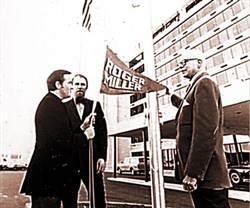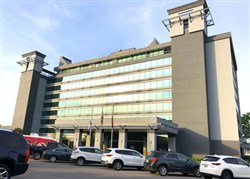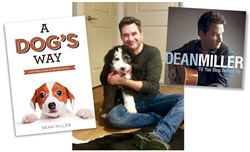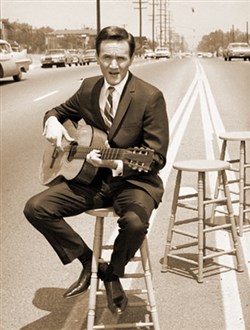VOL. 43 | NO. 18 | Friday, May 3, 2019
King of the Road was like Nashville’s own Vegas, complete with Miller’s ‘Rat Pack’

When the “Roger Miller” flag went up at the King of the Road Hotel, his friends knew it was an invitation to party.
-- Photograph ProvidedStanding on the open terrace outside the location of Roger Miller’s private suite next to The Roof, the Vegas-styled club atop his King of the Road Motor Inn, I look back in time and, dang me, I both wonder where it all went and celebrate that I can remember.
Dec. 31, 1972, was my first time in the glitzy showroom that time has turned to a meeting room or room-for-hire atop Roger’s old castle-shaped hotel (it had to be fit for THE KING of the road, after all)… a building that still stands – surprisingly, since this is Nashville – and houses the Clarion Hotel Downtown.
It’s obvious, from the date above, that first visit was New Year’s Eve, preparing for the hazy dawn of 1973. Back then, long before our city was tagged “It,” there weren’t any fireworks or mammoth musical notes or other new year’s festivities. Everyone just stayed home, bare-footed, and drank moonshine while sitting on hay bales …. Nah, not true, but a colorful caricature.
Some might, perchance, have tuned up a bit at Tootsie’s or her rugged and authentic honky-tonk kin and crossed the Cumberland River to King of the Road. We waited in line for the elevator to the ninth-floor club, where a fiery young singer and piano player – a combination of Ray Charles and Jerry Lee Lewis – and his great showband, imported from Memphis, had just begun what became a career-making residency the day after Christmas.
“The main draw down there for The Roof was Ronnie Milsap, and he was playing great,” says singer-songwriter, old-time rock ’n’ roller, producer and Nashville stalwart Buzz Cason. He adds “it was a long time ago,” but he and his late friend, “Little Green Apples,” “Honey” and “The Night the Lights Went Out in Georgia” songwriter Bobby Russell were minority owners in King of the Road Enterprises, which also opened a hotel in Valdosta, Georgia.
“It was a rockin’ place,” says Buzz of The Roof. “People would go over there after (recording) sessions. I think it stayed open until about 3. … It was that kind of thing.”
He points out that Ronnie was a piano-pounding showman in those years before his country star took off, and people loved him and loved to perform with him.
Ronnie was just following advice and his own good sense when he took the job on The Roof.
“Dottie West (who had been among the performers up there, along with folks like The Four Tops and The Platters), told me years ago to come to Nashville (from the Atlanta-Memphis circuit). I said I would if I had a job up there.”
Once he had a small foothold in Nashville, it didn’t take much convincing for him to climb to The Roof.
“Don Davis was manager of the King of the Road at that time,” he recalls, while relaxing at his Oak Hill estate on a recent afternoon. He was promised “a lot more money. Five nights a week instead of six.”
That, plus a place to stay, simplified the decision. “We used to pack them in,” Ronnie recalls. “People would be packed (outside in the parking lot), trying to come into the hotel. There was a line at the elevators.
“I brought the band I had in Memphis up,” Ronnie adds. And he often had to find a microphone to hand to an audience member: “All the stars came up there.
“Conway Twitty wanted to know if he could sing a song, ‘Proud Mary.’ Barbara Fairchild did her ‘Teddy Bear’ song. Johnny Rodriguez would get up there and sing ‘Pass Me By (If You’re Only Passing Through).’”
There is a perhaps apocryphal tale of the great Charlie Rich passing out drunk with the mic in his hand on the bandstand. I liked Charlie and I think that’s a good story. Likely true.
“A lot of the stars would want to sit in with that band,” Ronnie says, recollection’s happy roar filling his house. “We were THAT GOOD.”
Forty-six years and some mental abuse have dulled my memories, of course, but Ronnie’s showmanship was captivating to a guy more used to sneaking in the Ryman alley door to catch Lefty, ET, Tex, Tammy or Mother Maybelle and The Carter Sisters. Of course, I’d also follow some of them across the alley, into the back door of Tootsie’s, where I stayed out of their way and listened to their tales.
The main message I got from the great showman that night at The Roof was to come back as often as possible. I followed Ronnie’s advice.
Looking out the windows that surrounded that showroom back then, you’d see the WKDF letters, a skyline crowned by the well-lighted Capitol, empty boxcars, low-slung buildings and, if I recall correctly, the Bruton Snuff factory.
Now, using the terrace that once adjoined the fireplace-and-swinging-bed suite Ronnie occupied – at least when Roger wasn’t in town – there’s a half-century’s difference: Football stadium. Towers pushing high above former tall, tall trees. The beloved Batman Building (yes, I like it). A fleet of cranes. A temporary mammoth stage for the NFL Draft. A dandy riverboat on the Cumberland River, which separates what now is the Clarion Hotel Downtown Nashville from the city’s heart. (There’s a terrace on the north end, too, offering an even more sleepy perspective back then.)
Just as Roger Miller’s Nashville has disappeared, so has the lively suite and fireplace, replaced by the expansion of what is now a meeting and party room ideal for wedding receptions. The once-luxurious (I’m sure) private bathroom Ronnie or Roger used is now a storage closet.
“Roger Miller knew what he was doing,” says Charles Keef, assistant manager of the Clarion – where Roger and Ronnie created legendary nights – as he waves out to the sparkling spires of the It City. “He used to like to party, too.”
He laughs that the bed in that suite used to be chained to the ceiling, so it could rock and roll during intimacy or respite. “The bolts that used to hold those chains are still in the ceiling around here someplace,” he says. I can’t locate them, but I take his word for it.
What was Roger’s dream and Ronnie’s launchpad now is this East Nashville diamond-in-the-rough surrounded by industrial buildings, which soon, given the pace of boom, should be right in the thick of everything. Heck, a pair of “Bird” scooters are parked near the front door of the hotel.
Charles, who has worked at the hotel for 14 years, waves his arm across the near horizon and points out some of the construction projects that will forever vanquish the “rough” reputation of this neighborhood.

The King of the Road Motor Inn is now the Clarion Hotel Downtown, part of the Choice Hotels brand. which also owns Ascend Hotel Collection, Cambria Hotels, Sleep Inn, Quality Inn and more.
-- Photo By Lyle Graves |The Ledger“Six or seven years ago, you wouldn’t stay at this part of town,” Charles adds.
Cleaned up and with progress eroding the rough edges of East Nashville and Dickerson Pike, this is no longer a derelict hotel in the shadows. It is a flourishing tourist stop. On the day I’m there, all rooms are taken. The next day launched the NFL Draft, which pushed occupancy rates across the city. Here at the Clarion, front desk workers wait for cancellations that they fill in an instant while phones ring constantly.
For the things that happen in this building, good or bad, Charles blames or credits Roger Miller … “in person” … even though he’s never met the poet and playwright of the people with the Mark Twain-meets-Warren Zevon worldview. Cancer claimed Roger in ’92. He was just 56.
“Back when I worked on the third shift, I used to talk to Roger,” Charles says. “I used to blame him for something that went wrong. I’d just sit here and talk to him at night.” He nods across the conference room that’s just off the front lobby.
He adds that when the hotel is bustling, he also thanks Roger – who pioneered the “I’ll sleep when I’m dead” philosophy – for the uncommon energy shaking the building.
One of Faron Young’s sons dropped in not long ago and told Charles that when Roger was in town, when the parties were going in both the downstairs bar and upstairs where Ronnie was pounding the keys and wailing, “the whole building shook.”
Roger Dean Miller Jr. – always called “Dean” by his pop – spent some of his boyhood here, seeing his dad’s friends perform, eating flaming cherries while Ronnie and his band roared.
He, too, remembers the vanished suite. “Sometimes we’d stay there,” he recollects. “The bed was a queen-sized bed, attached from the ceiling on chains. It was a swinging bed. I remember a lot of shag carpeting and swinging on that bed with the chains. It was a different time.”
The family sometimes used a more traditional room. But the bed on chains – at least until Ronnie’s occupancy – was a hit with Roger’s friends.
“Somebody told me a story about Burt Reynolds (among Roger’s closest pals) swinging on that bed,” Dean adds. And when he was done swinging, Burt could look out the windows at what at the time was one of the few panoramic views of Dylan’s famous Nashville Skyline.
Dean – a former Hollywood actor who is a recording artist, successful producer and a man Emmylou Harris christened “the dog whisperer” for his near-miraculous work as a K-9 counselor (more later) has a 7-year-old’s memories of his dad’s hotel.
“My dad would raise a flag on top of the hotel, ‘The King of the Road’ flag, whenever he came to town. It was an invitation to party, let his friends know he was ready,” Dean explains.
“There’s a million stories about my dad in Nashville,” says this nice guy musician and dog expert.
“When Roger Miller invites you to a party, it’s not an invitation: It’s a challenge. He was known for staying up for days and living a rock ’n’ roll lifestyle.”

Dean Miller, Roger Miller’s son, also is a musician but is perhaps best known as a dog trainer for many of the music industry’s biggest stars.
-- Photographs ProvidedRonnie Milsap, who, of course, is blind, laughs at his good memories of spending days and nights with Roger Miller. “He would put his hands over my ears and say ‘Who is it?’”
His laughter is robust, before growing serious with a bit of advice for this writer: “Do a good story,” he says, noting his love for the long-ago club where he got his big break, where he played for months before going on the road with Charley Pride.
“It was the hottest place in town at that time. Everybody, when they got off work, they came. It was red-hot,” says the piano-playing band-leader who, like Roger Miller and Charley Pride and a few others mentioned in this column, holds a spot in the Country Music Hall of Fame.
The hotel, or its parking lot, also is a part of musical legend, thanks to Jimmy Buffett and Sheriff Buford Pusser.
Buffett even recalls his night there in song: “Well, the picture is fuzzy and the details are sordid, it was on the same day ‘God’s Own Drunk’ was recorded. A Walking Tall sheriff and a big Cadillac and me and golf shoes on the hood making tracks, this daring young singer was under attack,” he sings in “Semi-True Story.”
The story goes that Buffett and some friends had been drinking too much tequila. Somehow, Buffett couldn’t locate his rental car in the jammed parking lot at King of the Road. So, golf shoes and all (the spikes had been removed), he climbed up on a Caddy to scout for his car. It was Buford Pusser’s car he was using for his vantage point. The sheriff from McNairy County whose Hollywood image – there were a string of biopics that showed him clubbing foes into submission with a baseball bat-sized chunk of wood – didn’t like the long-haired drunk on his Cadillac.
As far as I can tell, from the various accounts, Buffett was lucky to get out of the parking lot after only losing a clump of hair that gave him a temporary bald spot.
“I was there the night of the Pusser incident,” says Buzz Cason, adding – perhaps unnecessarily – that his friend “Buffett had been drinking at the club.” (It was at about the same point in our nation’s glorious cultural history that Jerry Jeff Walker – writer of “Mr. Bojangles,” “Pissin’ in the Wind” and other classics – took Buffett, a struggling, young country singer-songwriter down to Key West, where Buffett enjoyed his first cheeseburger in paradise and craftily decided to cash in on a life wasted away again in Margaritaville).
“He got a lot of mileage out of the incident,” Buzz says. A Buffett pal to this day, “I was there and I went down the elevator with him, and this thing happened with Sheriff Pusser.”
It was well-covered by the media, probably not so much because of Buffett – who was just early in his career as the sly proselytizer of his changes in latitudes, changes in attitudes – but because of Pusser, who was enjoying Hollywood-exaggerated hero-worship as a sort of mean, redneck and less philosophic Davy Crockett, heralded for brutal clubbings of southwest Tennessee gangsters and folks he just didn’t like.

A PR photo from the Roger Miller show.
-- Photograph ProvidedDean Miller remembers other stars, his dad’s friends, who gathered at King of the Road. Waylon and Willie and the boys, for sure. Kristofferson, too. Silverstein. Bare.
Roger’s hip club altered local fashion, as well, according to Dean. “Nashville was at the height of that George and Tammy bad hair and polyester time. It was bouffants.
“My dad brought some rock star life to it.
“The things I remember most is my dad had the idea to put vending machines in the rooms, put cool snacks in the room. I always wanted the cheese and crackers,” Dean says.
“And futuristic décor in the rooms. TVs were on giant PVC piping with Styrofoam around the edge. It made it look like some sort of futuristic spaceship.”
Dean, who launched into the recording business because he had been intimidated by his dad’s success “but I didn’t want to back down from the challenge,” also remembers dining in the club.
“If we ever went out, I loved to order cherries jubilee as a kid, because they set it on fire. I thought I was in heaven. …
“Then, of course, my dad was treated like a superstar when we’d go there. I don’t think we appreciate as kids just how great it (life) is.”
Buzz says he and Bobby Russell lost about $10,000 apiece with their hotel and club investment.
A big part of the reason is that the namesake, The King of the Road himself, may have cashed in on “smoking old stogies I had found, short but not too big around” and other folksy tales, even mammoth and masterful Broadway success … but Roger was not a businessman, his son says.
“He was in a business partnership with other people. My dad was definitely one who liked to pore over numbers and paperwork,” he says, tongue planted firmly in a cheek that looks remarkably like his dad’s.
“He’s the one that if something started going haywire, he’d just say ‘shut it down.’ That’s kind of how my dad was. I don’t think he liked the hassle of it. I think he liked the prestige and the hustle of it.”
Other performers included Larry Gatlin and Tanya Tucker, Dean recalls, adding “I remember it feeling very glamorous when I was there. It felt like Vegas or something up there.
“I know a lot of people went up there and hung out. Faron Young went up there and hung out a lot with my dad. Then, of course, whoever was in the Nashville scene: Willie, Kristofferson, Buddy Killen. Waylon was always good to my family.”
It also was a location for some of Robert Altman’s great film “Nashville.” (My own close-up – directed personally and hands-on-my-shoulder by Altman moments after the Centennial Park climax – ended up on the proverbial cutting room floor, by the way. Extras that day were paid with as much watermelon as we could eat.)
Dean says watching Altman’s biting look at Music City gives viewers a feeling for the club itself.
I should mention that while Dean has followed his father’s pathway somewhat into show business, he is at least as well-known for his mastery and love of dogs.

A 1974 advertisement for one of Nashville’s top entertainment venues.
-- Photograph Provided“I’m a jackoff of all trades,” he says, showing a dash of his father’s humility and irreverence. “My producing business is Dean Miller Entertainment, my dog business is The Dog Counselor. I’m also a recovering artist. I’ve done four albums that were sort of released with no promotion.
“I’ve sort of made every terrible music business decision,” he says, again jabbing himself. “I’m about to put something out this summer, ‘1965,’ the year I was born.
“My goal with this record was to write everything with no cowriters, produce with no co-producers, pay for it myself and I can say: ‘I DID THAT.’”
He’s still figuring out the promotion aspects of this personal project. “It’s gonna be a shoestring budget, which will probably hamstring the project. I think I’ll just wave it at people and hope they grab one.
“All my life I’ve been sharing decisions with other people, and I always end up frustrated.”
His production work has thrived and he has worked with a list from Dolly to Haggard to Kris to Stapleton to his dad.
Now, this “kid” who grew up with a legendary pop and sometimes at Nashville’s Vegas-style nightclub and hotel, is choosing happiness first. “I’m just going to stop working for results, doing the things I love. I love dogs and music. I found a way I could make a living playing with dogs and playing with music. It’s working out.”
His dog training clients include Emmylou, Kenny Chesney, Alan Jackson and more. The late George Jones praised the work Dean did with Bandit, the dog who liked to watch “Gunsmoke” and “Bonanza” reruns with the singer at his Williamson County estate. I joined him and Bandit some.
Dean also has a book, “A Dog’s Way: How Dogs Make Us Better People.”
Meanwhile, back at the castle-shaped hotel, the dream of The King of the Road, general manager Bob Handzel won’t let Dean’s pop be forgotten.
“Roger is on every floor,” he notes, referring to portraits that are over the front desk and at both ends of all the floors, so guests can encounter the man whose vision and sense of fun and celebratory excess led to this hotel’s existence.
“We want him to be a part of the history of this hotel.
“He was the one who sort of put the whole thing together,” says Bob, the manager. “Without him, we wouldn’t be here. We get asked a lot of questions about it. We do explain it to the best of our ability …. Being the first high-rise hotel in the city and the events he had here with Ronnie Milsap and Dottie West.
“I think Roger would be happy. He would want people to be served the way we do.”
“The young ones don’t know who he is,” says Charles, the assistant manager, adding that according to legend, the place was so busy “Elvis couldn’t get a room here.” He probably would have shot the spaceship-looking TV anyway.
“Most people don’t know who Roger Miller is,” says hotel manager Bob, though he and Charles both say that if they mention the song “King of The Road,” most guests recall.
“He’s been gone a long time,” Charles adds.
Outside, I catch Audrey and Lyle Gross, from Calgary, Alberta, Canada, who are unloading their car for check-in. They are planning on staying for a week, but add when they booked the Clarion – actually until I told them about it – they didn’t know about the Roger Miller legacy of this hotel.
“I do remember Roger Miller,” Audrey says. “I do know ‘King of the Road.’”
“He used to play some goofy songs, too,” Lyle adds. “He had his own style.”
Dean says people older than 40 – like the Grosses – “would remember my dad. But I think if you go down to Broadway now and ask one of those bachelorette parties….” Well, most of them can’t remember the night before.
“One of the cool things was that back then there were no limos in Nashville of any regularity,” Dean recounts. “My dad was living the high life out in L.A., and he got irritated that there were no limo companies in Nashville.
“He got someone to go down somewhere in Alabama and find a limo just to be his driver when he was in town.”
Among those who enjoyed Roger’s stretch ride was pal Waylon, Dean says. “There’s an old story about Waylon seeing Billy Joe Shaver walking down the street. Waylon opens up his window and says ‘Get in. Walking’s bad for your image.’” Billy Joe, like all of us, did what Waylon said.
“I think (the driver) started a limo company from that, so I’m told,” Dean says. “My dad was into that rock star image.”
Back at his Oak Hill estate, Ronnie is still jovial, thinking about the fun – and the career boost – he got thanks to the hotel that should be considered Roger Miller’s monument here in Nashville.
“I sometimes wish I could do an event up there, kind of like it (The Roof) used to be,” Ronnie says. “That would be fun for me.
“Be careful what you wish for, I guess.” He laughs, but he can count me in.
Standing on that terrace, looking to the past, I smile and silently “brain-sing” toward the skies, Hillbilly Heaven and Roger, who I only knew slightly.
“I hear you’re doin’ well …. Do wacka, do wacka, do wacka, do wacka, do wacka do….”